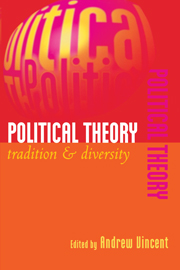Book contents
- Frontmatter
- Contents
- Preface
- List of Contributors
- Introduction
- 1 Political Theory and Conceptual Change
- 2 Political Theory and the Problem of Anachronism
- 3 Utilitarianism as a Public Philosophy
- 4 Rational Choice Political Theory
- 5 Republican Political Theory
- 6 Liberalism, Multiculturalism and Oppression
- 7 Postcolonialism and Political Theory
- 8 Legal Positivism and Political Power
- 9 Political Theory, International Theory, and the Political Theory of International Relations
- 10 Method Matters: Feminism, Interpretation and Politics
- 11 The Political Philosophy of Deleuze and Guattari
- 12 The Object of Political Theory
- Index
8 - Legal Positivism and Political Power
Published online by Cambridge University Press: 29 March 2011
- Frontmatter
- Contents
- Preface
- List of Contributors
- Introduction
- 1 Political Theory and Conceptual Change
- 2 Political Theory and the Problem of Anachronism
- 3 Utilitarianism as a Public Philosophy
- 4 Rational Choice Political Theory
- 5 Republican Political Theory
- 6 Liberalism, Multiculturalism and Oppression
- 7 Postcolonialism and Political Theory
- 8 Legal Positivism and Political Power
- 9 Political Theory, International Theory, and the Political Theory of International Relations
- 10 Method Matters: Feminism, Interpretation and Politics
- 11 The Political Philosophy of Deleuze and Guattari
- 12 The Object of Political Theory
- Index
Summary
This chapter presents a thesis about Legal Positivism and political power, to the effect that positivism is a defensible theory which is addressed to both the facilitation and the proper limitation of power in society. More particularly, it is argued that Ethical Positivism, identified as an ethically normative mode of Legal Positivism (Campbell 1996), is required to give point and purpose to the constitutional doctrine of the separation of powers. To articulate this broad thesis, some analytical work is undertaken concerning varieties of power which is of general relevance to the heartland of political theory. The object of this analysis is to identify the sort of power that judges can exercise, and to work out how we might distinguish between legitimate and illegitimate uses of judicial power. The chapter concludes that, in an adequately functioning democratic system, acceptable rationales for the doctrine of the separation of powers imply that judges should not exercise political power.
The current critical orthodoxy is that Legal Positivism is a doctrine which latently supports the mythological autonomy of law and hence, it is argued, underpins the often hidden political power of judges and lawyers (Cotterrell 1989: 216–35). The consensus is that Legal Positivism is a lawyers' theory which falsely legitimizes the role of judges and enables them to exercise extensive political power without appearing to do so (Hutchinson and Monohan 1986).
- Type
- Chapter
- Information
- Political TheoryTradition and Diversity, pp. 172 - 192Publisher: Cambridge University PressPrint publication year: 1997

